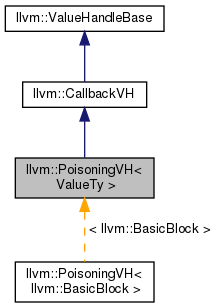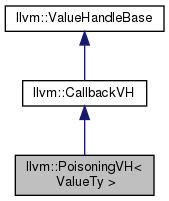Value handle that poisons itself if the Value is deleted. More...
#include "llvm/IR/ValueHandle.h"


Public Member Functions | |
| PoisoningVH ()=default | |
| PoisoningVH (ValueTy *P) | |
| PoisoningVH (const PoisoningVH &RHS) | |
| ~PoisoningVH () | |
| PoisoningVH & | operator= (const PoisoningVH &RHS) |
| operator ValueTy * () const | |
| ValueTy * | operator-> () const |
| ValueTy & | operator* () const |
 Public Member Functions inherited from llvm::CallbackVH Public Member Functions inherited from llvm::CallbackVH | |
| CallbackVH () | |
| CallbackVH (Value *P) | |
| operator Value * () const | |
 Public Member Functions inherited from llvm::ValueHandleBase Public Member Functions inherited from llvm::ValueHandleBase | |
| ValueHandleBase (HandleBaseKind Kind) | |
| ValueHandleBase (HandleBaseKind Kind, Value *V) | |
| ~ValueHandleBase () | |
| Value * | operator= (Value *RHS) |
| Value * | operator= (const ValueHandleBase &RHS) |
| Value * | operator-> () const |
| Value & | operator* () const |
Friends | |
| struct | DenseMapInfo< PoisoningVH< ValueTy > > |
Additional Inherited Members | |
 Static Public Member Functions inherited from llvm::ValueHandleBase Static Public Member Functions inherited from llvm::ValueHandleBase | |
| static void | ValueIsDeleted (Value *V) |
| static void | ValueIsRAUWd (Value *Old, Value *New) |
 Protected Types inherited from llvm::ValueHandleBase Protected Types inherited from llvm::ValueHandleBase | |
| enum | HandleBaseKind { Assert, Callback, Weak, WeakTracking } |
| This indicates what sub class the handle actually is. More... | |
 Protected Member Functions inherited from llvm::CallbackVH Protected Member Functions inherited from llvm::CallbackVH | |
| ~CallbackVH ()=default | |
| CallbackVH (const CallbackVH &)=default | |
| CallbackVH & | operator= (const CallbackVH &)=default |
| void | setValPtr (Value *P) |
 Protected Member Functions inherited from llvm::ValueHandleBase Protected Member Functions inherited from llvm::ValueHandleBase | |
| ValueHandleBase (const ValueHandleBase &RHS) | |
| ValueHandleBase (HandleBaseKind Kind, const ValueHandleBase &RHS) | |
| Value * | getValPtr () const |
| void | RemoveFromUseList () |
| Remove this ValueHandle from its current use list. More... | |
| void | clearValPtr () |
| Clear the underlying pointer without clearing the use list. More... | |
 Static Protected Member Functions inherited from llvm::ValueHandleBase Static Protected Member Functions inherited from llvm::ValueHandleBase | |
| static bool | isValid (Value *V) |
Detailed Description
template<typename ValueTy>
class llvm::PoisoningVH< ValueTy >
Value handle that poisons itself if the Value is deleted.
This is a Value Handle that points to a value and poisons itself if the value is destroyed while the handle is still live. This is very useful for catching dangling pointer bugs where an AssertingVH cannot be used because the dangling handle needs to outlive the value without ever being used.
One particularly useful place to use this is as the Key of a map. Dangling pointer bugs often lead to really subtle bugs that only occur if another object happens to get allocated to the same address as the old one. Using a PoisoningVH ensures that an assert is triggered if looking up a new value in the map finds a handle from the old value.
Note that a PoisoningVH handle does not follow values across RAUW operations. This means that RAUW's need to explicitly update the PoisoningVH's as it moves. This is required because in non-assert mode this class turns into a trivial wrapper around a pointer.
Definition at line 450 of file ValueHandle.h.
Constructor & Destructor Documentation
◆ PoisoningVH() [1/3]
|
default |
◆ PoisoningVH() [2/3]
|
inline |
Definition at line 502 of file ValueHandle.h.
◆ PoisoningVH() [3/3]
|
inline |
Definition at line 503 of file ValueHandle.h.
◆ ~PoisoningVH()
|
inline |
Definition at line 506 of file ValueHandle.h.
Member Function Documentation
◆ operator ValueTy *()
|
inline |
Definition at line 522 of file ValueHandle.h.
References llvm::ValueHandleBase::getValPtr().
◆ operator*()
|
inline |
Definition at line 525 of file ValueHandle.h.
◆ operator->()
|
inline |
Definition at line 524 of file ValueHandle.h.
◆ operator=()
|
inline |
Definition at line 511 of file ValueHandle.h.
Friends And Related Function Documentation
◆ DenseMapInfo< PoisoningVH< ValueTy > >
|
friend |
Definition at line 455 of file ValueHandle.h.
The documentation for this class was generated from the following file:
- include/llvm/IR/ValueHandle.h
 1.8.13
1.8.13